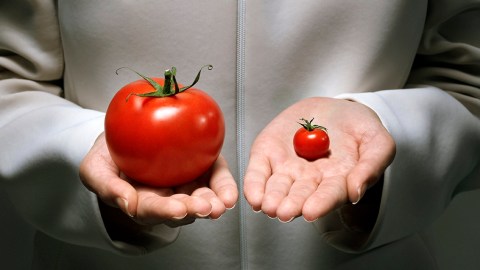Are GMOs Really That Bad?

Fans of Bill Nye were not happy when he announced that GMOs might not be that bad; in fact, he feels that GM foods might be beneficial. He lists three reasons for changing his mind:
Nye admits that he was wrong in his previous assertion that GMOs are bad, period. (Given the online response, that is exactly how many of his fans feel.) He also supports patents on hybridized plants, reminding everyone that patents expire—soybeans, for example, are now available for public usage.
Which brings us to Soylent. Silicon Valley’s favorite open-source, methane-producing, meal-replacement beverage is unapologetically not GMO-free. This makes sense given its scientifically inclined fanbase. While groups like Greenpeace vehemently oppose GM crops—non-GMO foods are currently a $16 billion industry—a group of over a hundred Nobel laureates signed a letter urging the activist group to take a hit of GM-free valerian root.
The list of groups that have declared GMOs safe for consumption include the National Academy of Sciences, the European Commission, and the American Association for the Advancement of Science. Like it or not, GMOs are used in insulin; most T-shirts are woven with genetically modified cotton.
The Nobel letter echoes claims by above organizations:
We urge Greenpeace and its supporters to re-examine the experience of farmers and consumers worldwide with crops and foods improved through biotechnology, recognize the findings of authoritative scientific bodies and regulatory agencies, and abandon their campaign against ‘GMOs’ in general and Golden Rice in particular.
Greenpeace’s response notes the long failure of Golden Rice, which is true. Invented as a means of providing impoverished, rural citizens of Asian countries an affordable, beta-carotene-rich food source, it has been decades of development with little result. Greenpeace is also correct that providing a diverse healthy diet is a powerful way of combating malnutrition.
Yet there’s something frightening when any organization speaks in self-righteous tones, implying that the diet they’re engineering is the “only guaranteed solution.” Extensive testing should be done on GMOs—Nye points out that standards are rigorous, though how seriously the FDA regulates companies is another story.
Point being, this is not a black-and-white issue, even though many people treat it as such. Are genetically modified tomatoes as bad as soybeans? What modifications has each undergone? What clinical trials have been conducted? What are the results?
These are questions that need to be asked on a case-by-case basis. Demonizing GMOs whole cloth is not helpful in a world that, as Nye suggests, is rapidly increasing in size. Scientists assess safety based on what the genes do and how they change the structure of the plants.
It is odd that this is the great debate of modern food, not the proven damaging effects of sugar. Perhaps that addiction is too close to home for too many people; perhaps it’s not sexy enough of a cause. Getting people proper nutrition seems a valuable goal, while Nestle exploiting indigenous Amazonian populations with sugar-heavy, processed foods barely gets a whimper.
Should you avoid Soylent because it contains GMOs? Probably not. Avoid it simply because it’s Soylent.
—
Derek Beres is working on his new book, Whole Motion: Training Your Brain and Body For Optimal Health (Carrel/Skyhorse, Spring 2017). He is based in Los Angeles. Stay in touch @derekberes.





